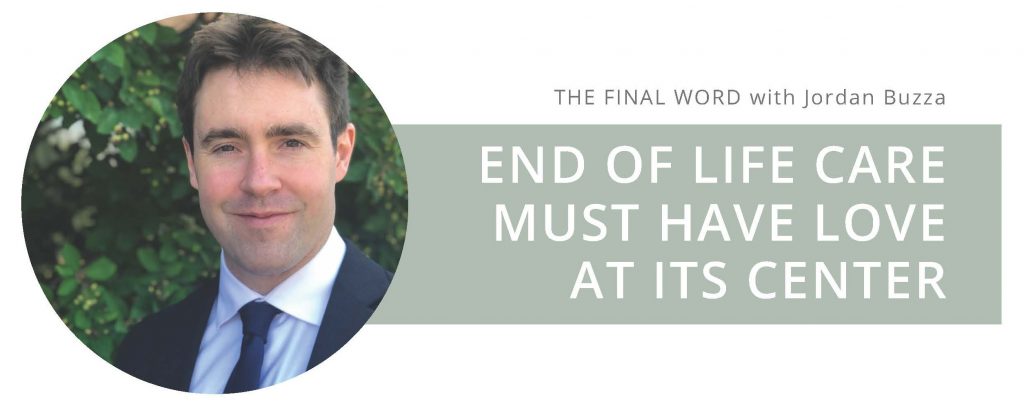The Final Word: End of Life Care Must Have Love At It’s Center

The core problem underlying end of life care, and our treatment of the aged and medically vulnerable in our society, is a lack of love. Our failure to love, individually and societally, defies our Lord’s desire for us to love our neighbors as we love ourselves. As Pope St. John Paul II wrote, “[T]he person is a good towards which the only proper and adequate attitude is love.” Since we may only love others, that is, to will and strive for their authentic good, we cannot use them or treat them differently based on a cost-benefit analysis of whether or not they seem “valuable,” to ourselves or to society. We can only love, for we are all made in the image and likeness of God.
Problems arise when we fail to love and when we internalize the idea that it is possible for a life to become overburdened and useless. These problems are compounded when professionals and society at large externalize these ideas into policies and laws. When this happens–when a society decides that each and every human isn’t worthy of love–then its citizens suffer and human rights abuses occur. Today, some in our society struggle to understand that the aged and those at the end of their lives are worthy of love, a love that enables them to live and die naturally. This lack of love imposes suffering and abuses upon these vulnerable patients and their families.
To be clear, the call to love, and therefore to oppose assisted suicide and euthanasia, does not mean abandoning patients in their pain. Nor does it require certain excessively burdensome medical interventions. Rather, it means that we respect God’s will and seek Him in all things, bringing comfort and love to those in the process of dying.
The COVID-19 pandemic has highlighted a lack of understanding regarding human dignity and how we should love one another. Unfortunately, many medical professionals and systems promote “maximizing life years,” that is, prioritizing care and resources in favor of younger, healthier patients by taking them from older patients. During COVID-19, this might mean that a 40-year-old is given priority access to a ventilator over a 70-year-old, who is left to die.
Practices such as this cultivate an implicit pro-euthanasia mindset. But this mindset of “maximizing life years” is a lie; the lives of the aged are not less valuable than the lives of the young. At every stage from natural conception to natural death, our lives are always worth living (and defending). A terminally sick person should not be viewed as a burden, as those in favor of euthanasia would encourage society to believe. It is truly heartbreaking when people feel the need to end their lives for any reason, but especially when they have been made to feel that their stage of life or medical situation deems them unworthy of others’ time and resources—when they do not feel worthy of love.
No matter the circumstances, we are always worthy of love. Our God is a God of the living, and our lives are a gift from Him. We will each die, but we must be allowed to die naturally in accord with God’s plan for our lives and our salvation. And as we die, we deserve to be loved throughout the process. Christ’s love is a redeeming love. We are called to live that love; to evangelize that everyone’s life has equal and inherent value. If we want to fulfill the call to love our neighbors, we must ensure everyone is loved, without exception. When that happens, then our deaths will conform with our dignity.
Jordan Buzza, JD is a husband and father residing in Pennsylvania. He is the Director of CMF CURO, a Catholic health care ministry and a member-representative to Samaritan Ministries International that provides Catholics an affordable alternative to medical insurance that embraces Catholic teaching and strengthens Catholic community.
This article appeared in the April 2021 edition of The Catholic Telegraph Magazine. For your complimentary subscription, click here.













